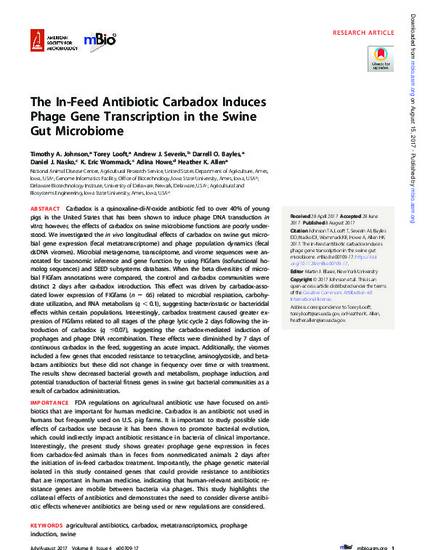
Carbadox is a quinoxaline-di-N-oxide antibiotic fed to over 40% of young pigs in the United States that has been shown to induce phage DNA transduction in vitro; however, the effects of carbadox on swine microbiome functions are poorly understood. We investigated the in vivo longitudinal effects of carbadox on swine gut microbial gene expression (fecal metatranscriptome) and phage population dynamics (fecal dsDNA viromes). Microbial metagenome, transcriptome, and virome sequences were annotated for taxonomic inference and gene function by using FIGfam (isofunctional homolog sequences) and SEED subsystems databases. When the beta diversities of microbial FIGfam annotations were compared, the control and carbadox communities were distinct 2 days after carbadox introduction. This effect was driven by carbadox-associated lower expression of FIGfams (n = 66) related to microbial respiration, carbohydrate utilization, and RNA metabolism (q < 0.1), suggesting bacteriostatic or bactericidal effects within certain populations. Interestingly, carbadox treatment caused greater expression of FIGfams related to all stages of the phage lytic cycle 2 days following the introduction of carbadox (q ≤0.07), suggesting the carbadox-mediated induction of prophages and phage DNA recombination. These effects were diminished by 7 days of continuous carbadox in the feed, suggesting an acute impact. Additionally, the viromes included a few genes that encoded resistance to tetracycline, aminoglycoside, and beta-lactam antibiotics but these did not change in frequency over time or with treatment. The results show decreased bacterial growth and metabolism, prophage induction, and potential transduction of bacterial fitness genes in swine gut bacterial communities as a result of carbadox administration.
Available at: http://works.bepress.com/andrew-severin/18/

This article is from mBio vol. 8 no. 4 (8 August 2017) e00709-17, doi:10.1128/mBio.00709-17.